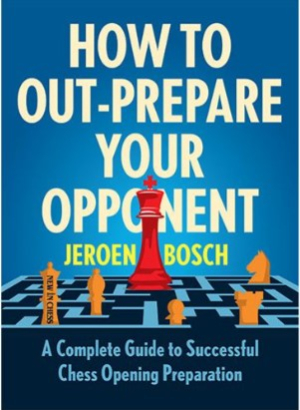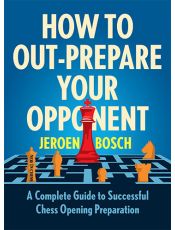
How to Out-Prepare Your Opponent on ECF Book of the Year Shortlist
How to Out-Prepare Your Opponent by Jeroen Bosch is on the shortlist for the English Chess Federation Book of the Year 2022.
In this age of computer preparation, we are all trying to out-prepare our opponent. But is that really possible?
International Master Jeroen Bosch sheds some light on this topic and presents some very useful insights that can help you to better understand this phase of the game.
In two blog posts, we will share some of the content of this nominated book. In the first one, you can find the foreword written by GM Anish Giri who himself is well-known for his deep opening preparation. In the second post, we will present you one of the chapters.
Foreword by Anish Giri
How to out-prepare your opponent is the question that is on the mind of every chess player. For me personally, opening preparation is the aspect of the game that stands central to how I perceive the entire struggle. Due to my obsessive passion for chess openings, I end up trying to rationally justify the endless pursuit of opening knowledge, telling myself that if I figure out the key to out-preparing my opponents, I will crack the enigma code of the game as a whole.
My Dutch colleague Jeroen Bosch belongs to the same group of opening aficionados and those familiar with his SOS-series (‘Secrets of Opening Surprises’) will know that the author of this book is a very qualified person on the mission to guide you and help you find your personal answer to the question this book poses.
I got to know Jeroen Bosch a lot better as fate kept placing us on adjacent seats on multiple flights towards international team events, where I would represent the Dutch team and Jeroen would travel with us as a coach and the head of our delegation. His vast knowledge of the game is impressive and if not for his very friendly presentation, I would certainly feel quite intimidated and somewhat embarrassed, not aware of the countless chess tales and stories Jeroen had in store for me. I had that same feeling of mild discomfort when I encountered the abundance of theoretical knowledge in this book that was entirely new to me. It truly is amazing how rich our game is, but only a person as knowledgeable as Jeroen can fill a book like this with thought-provoking opening ideas and inspirational lines that can be of value for players of absolutely all levels.
While this meticulously structured book gradually equips you with tools and methods to answer the question of how to outprepare your opponent, in some way it is also a combination of opening articles and surveys, material Jeroen has so much experience in creating. Every sample game or cornerstone of a statement Jeroen makes is not just thoroughly annotated in the opening phase. No; for example, if the game happened to feature the tricky Veresov Attack, whether he wants it or not, the reader will be taken on a journey through the ins and outs of the Veresov, with all the possible deviations at the earliest stages, and some even at serious depth!
I will not go too much into what you should expect from this book. That is something you can find in Jeroen’s introduction. What I will do instead is express my wish and conviction that my fellow readers will find this book as gripping and as useful as I did.
Anish Giri, The Hague, May 2022

